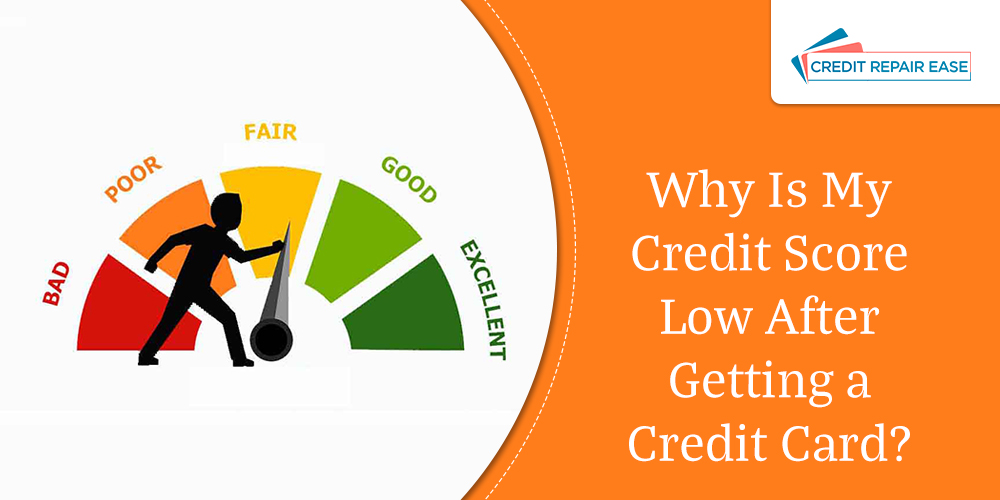Why Is My Credit Score Low After Getting a Credit Card
The credit score
is one of the most important measures in your financial world. Card issuers
pull your credit report when you apply for a new credit card. They want to see
how much of a risk you pose before lending you a line of credit. This credit
check is called a hard inquiry and can lower your credit score by a few points.
Paying
off a credit card will not hurt your credit score. It can take a month or two
for paid-off balances to be reflected in your score. Reducing credit card debt
can result in a score boost, as long as your other credit accounts are in good
standing.
Credit
cards will affect your credit scores in many ways. From the application to your
usage, payment history, and significant role in your credit scores.
If
your credit scores are low, even with using your credit cards, you need to take
a look at your report and work to improve it. If your credit score is low after
getting a credit card, keep reading to find out how to avoid such cases.
Opening a Credit
Card Impacts Your Credit Score
While
determining your credit score, credit scoring models take a look at your credit
card activity. You have more discretion with how you manage credit cards than
what you do with other types of credit. How you handle your credit card
accounts helps the scoring models to measure what type of risk you pose to
lenders.
Credit
checks impact your credit score when you apply for a new credit card. A few
ways are opening a credit card can affect your credit score.
Adds
Hard Inquiries to Your Credit Report
Lenders
inquire about your credit to determine what risk you pose as a borrower. As you
know, there are two types of inquiries on your credit report.
Soft
inquiries don’t have much of an impact on your credit score. For example,
checking a credit report and qualifying for special offers from credit issuers
is a soft inquiry.
Lenders
perform hard inquiries when they lend you money, and it can affect your score
negatively in a short period.
Applying
for a new credit card will leave a hard inquiry on your credit report, which
can lower your score by a few points.
Hard
inquiries remain on your report for two years, which will affect your credit
score for at least a few months.
Increase Your Credit Mix
If you
don’t have a credit card, you may have other forms of credit, like a personal
loan or auto loan. These are called installment loans where you do the
following:
- You
borrow a set amount of money.
- You
pay it off in monthly installments.
- You
close the account, once all installments are paid.
On the
other hand, credit cards are revolving credits. Revolving credit allows you to
borrow over and over at a set limit as long you make a minimum payment every
month. Any unpaid balance revolves around monthly payments. The credit card
company charges interest on whatever balance remains unpaid.
If you
hold installment credit, getting a credit card will increase the types of
credit you maintain. This is known as a credit mix.
If you have both installment and revolving credit, it shows lenders you can
manage different types of credit accounts. This helps your credit score. Credit
mix accounts for 10% of your FICO Score,
which is the scoring model most used by lenders.
Do
You Know Using Your Credit Card Can Affect Your Score?
If
your credit score is low after getting a credit card, using your credit card
can affect your score as well. Your score depends on how you use and manage
your credit card. How much you spend on your card versus how you handle
payments can do much to improve
your credit score.
Credit
scoring models weigh payment history more than any other scoring factor.
Payment history alone accounts for 35% of your FICO Score. Making all your
credit card payments on time every month will help you to improve your credit
score. By making the minimum payments within the due date every month, you can
greatly improve your credit score.
If you
make any-one payment more than 30 days past the account’s due date, it can have
a seriously negative impact on your credit score.
To
ensure that you do not miss a payment, set up an autopay on your credit card.
You should have enough money in your checking account to cover the payment
every month.
It is
best to pay off your credit card balance each month to avoid interest charges.
If you’re unable to pay off your card each month, then try to keep your credit
utilization ratio under 30% across your credit accounts. Increasing your credit
cards not only hurts your credit
utilization ratio, if you are not careful, but it can also make
keeping up with payments difficult. Try out our Online Credit Card
Management System.
Closing a Credit
Card Can Hurt Your Credit Score
When
you close a credit card account, you reduce the amount of credit available to
you. This can negatively impact your credit score because that account no
longer increases your credit utilization ratio.
It is
better to keep your credit card accounts open, even the ones that have not been
in use for a while. This will help you increase the amount of available credit
you have for the debt you owe.
If you
are paying high annual fees for cards you’re not using, or if a card is too
hard to resist, your credit score won’t take a big hit if you choose to close
your account.
If you
pay your balances every month and have cards with a long credit history, the
effect might be minimal. If you have paid your bill on time every month, your
closed account can remain on your credit report for 10 years.
You
can get a free credit report from the main three credit bureaus: Experian, Equifax,
and TransUnion.
It is best to frequently check the report to make sure that you are on the
right track, as well as know where you can improve your credit score.
Also,
Read
How
to get a secured credit card?
850
Credit Score – All you need to know
Credit Card
Debt Relief Gets You Debt Free in 36 Months or Less




Comments
Post a Comment